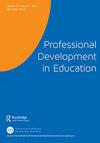批判性反思培养种族差异的变革意识
IF 3.1
3区 教育学
Q1 EDUCATION & EDUCATIONAL RESEARCH
引用次数: 0
摘要
摘要有抱负的教育领导者必须了解自己和他人的文化,才能有效地领导学校,并为传统上被边缘化的学生实现公平的结果。为了探索专业学习影响学生文化互动参考框架的潜力,我们分析了美国公立大学教育领导力准备项目中研究生的自我反思论文。我们调查了当学生反思他们第一手(直接接触和对话)和第二手(新闻报道和故事)与明显不同于自己的人的接触时,种族和民族的社会文化扭曲。课程包括阅读、讨论和关于种族互动的反思性日记。我们利用Mezirow的变革性学习理论来了解学生是如何发展自我意识并在跨文化能力和敏感性阶段取得进步的。大多数参与者都经历了跨文化敏感性的发展阶段,许多人从以种族为中心的立场转向了相对种族的立场。研究结果表明,有目的地设计学习体验的重要性,使有抱负的领导者在担任正式领导职务之前,能够批判性地自我反思种族和公平问题。本文章由计算机程序翻译,如有差异,请以英文原文为准。
Critical reflection to develop transformative consciousness of racial differences
ABSTRACT Aspiring educational leaders must understand their own culture and the cultures of others to lead schools effectively and realise equitable outcomes for traditionally marginalised students. To explore the potential for professional learning to affect students’ frames of reference regarding cultural interactions, we analysed self-reflection papers from graduate students within an educational leadership preparation programme at a US public university. We investigated sociocultural distortions of race and ethnicity when students reflected on their first-hand (direct contact and conversations) and second-hand (news reports and stories) encounters with people who are phenotypically different from themselves. The course included readings, discourse, and reflective journaling about racial interactions. We utilised Mezirow’s theory of transformative learning to understand how students developed self-awareness and progressed through stages of intercultural competence and sensitivity. Most participants progressed through developmental stages of intercultural sensitivity, and many moved from ethnocentric to ethnorelative stances. Findings indicate the importance of purposely designing learning experiences that allow aspiring leaders to critically self-reflect on topics of race and equity prior to assuming formal leadership positions.
求助全文
通过发布文献求助,成功后即可免费获取论文全文。
去求助
来源期刊

Professional Development in Education
EDUCATION & EDUCATIONAL RESEARCH-
CiteScore
6.30
自引率
4.80%
发文量
27
 求助内容:
求助内容: 应助结果提醒方式:
应助结果提醒方式:


